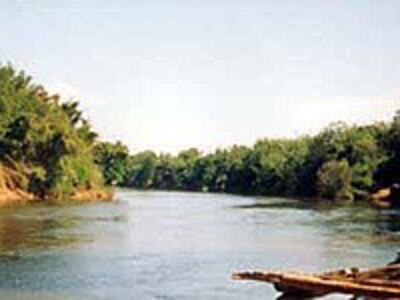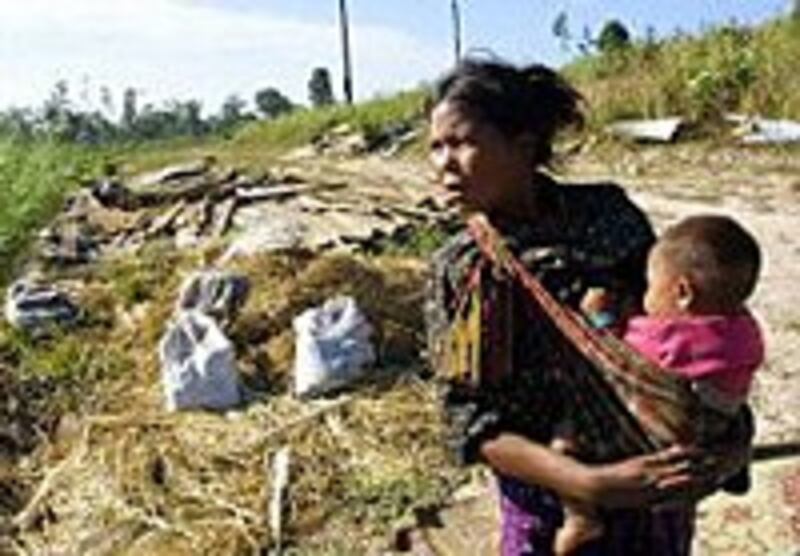
WASHINGTON—The World Bank is expected soon to announce backing for the controversial Nam Theun 2 dam project in Laos, which the Lao government hopes will change its fortunes as one of Asia’s least developed countries.
"At this stage it would take a surprise or something unexpected to derail it," Peter Stephens, World Bank chief external officer for East Asia and the Pacific, told RFA.
The Bank announced in January it would move to appraise the project—in which private investors claim to have invested U.S.$40 million already.
A decision is widely expected by May at the latest, although Stephens said the Bank would take as long as it needed to make the appraisal.
"That said, there are still a few issues that we are really working pretty intensively on to make sure that we are very, very comfortable with," Stephens said, citing social and environmental questions.
Analysis questioned
The decision to begin appraising the U.S.$1.3 billion project has met with harsh criticism from non-governmental organizations (NGOs), who advocate far more work to determine the true impact of the dam on local people, and the fragile ecosystems surrounding the affected Mekong River tributaries.
"It is alarming that the World Bank is moving to appraise Nam Theun 2 when so many gaps in project analysis remain," Aviva Imhof, East and Southeast Asia program director for International Rivers Network (IRN), said in a statement on the group's Web site.
"Considering the project's size and scope, it is shocking that a rigorous analysis of potential impacts and clear, feasible plans for compensating affected communities still do not exist," Imhof said, calling on the World Bank to suspend forward movement on the appraisal.
At this stage it would take a surprise or something unexpected to derail it... That said, there are still a few issues that we are really working pretty intensively on to make sure that we are very, very comfortable with.
In an interview with RFA's Lao service, civil society expert Anek Nakhabout said local villagers had told him jobs would help resolve their current poverty. "It would provide an opportunity to earn money in cash. Therefore, they are interested in employment as laborers with construction companies and so on," he said.
Asked whether villagers had any idea of the long-term impact of the Nam Theun 2 project, Anek Nakhabout—who was engaged to carry out social impact research by the World Bank—said: "I don't think the villagers understand the long-term impact. It is something that they cannot even imagine."
Hard currency and a positive signal
The project was conceived by a consortium including Electricité de France, two Thai companies, and the Lao government.
It is expected to displace around 6,200 indigenous people and affect more than 100,000 villagers who depend on the Xe Bang Fai River for their livelihood, according to research by NGOs.

It is being billed as a major foreign currency earner for Laos, which expects to sell the power generated by the dam to Thailand.
The World Bank's Stephens said a successful investment of this size in Laos would send a positive message to the world, and stimulate foreign direct investment in the country.
But NGOs who commissioned technical reviews of the environmental and social impacts along the Xe Bang Fai River and the Nakai Plateau say they have found "major gaps" in documentation related to the project.
The IRN said the Lao government lacked the capacity or political will to effectively manage potential revenue from the project or mitigate the impact on tens of thousands of lives.
Laos sees few alternatives
"Past hydropower dams have left a trail of devastation in their wake. Yet instead of drawing lessons from these projects, the World Bank is relying on blind faith that Nam Theun 2 will be different," Imhof said.
One hydro-geologist who reviewed the plans cited insufficient data for a proper impact study. "The consequences will be vast and difficult to predict: flooding, erosion, disruption of biological and human systems," the IRN quoted Peter Willing as saying.
The Lao government believes that the Nam Theun 2 is one of the projects with high potential for income generation. Therefore, we consider this project important for poverty eradication, for helping Laos remove itself from underdevelopment in 2020 as planned.
Lao government officials, with scant natural resources to stimulate economic development, have tried to show the potential benefits for their citizens, bringing out local villagers to endorse the dam in comments to visiting journalists.
"The Lao government believes that the Nam Theun 2 is one of the projects with high potential for income generation," Lao Finance Minister Somdy Douangdy told RFA's Lao service.
"Therefore, we consider this project important for poverty eradication, for helping Laos remove itself from underdevelopment in 2020 as planned," he said.
Corruption fears
World Bank officials have also sought to calm fears that the project will fall prey to corrupt officials in the Lao government.
"In any project financed by the Bank, as soon as corruption is detected, we go to the government and we cancel that covenant immediately," regional infrastructure director Christian Delvoie told RFA.
And the Asian Development Bank (ADB), which is also likely to back the project pending World Bank approval, said it was confident that its evaluation systems could keep a project like Nam Theun 2 on track.

"We measure the performance of a country on various criteria—macroeconomic performance, stability, governance reform, policy and institutional developments, and of course, our portfolio management," Urooj Malik of the ADB's Mekong department said.
Asked how the World Bank could be sure of the dam's impact in three years' time, Stephens, of the World Bank, said, "The only answer I can give…is that at one level this is a very important project that produces direct results and financial support to the people of Laos, a country which essentially has very few other options apart from chopping down forests or gold-mining."
"At another very important level, this is the biggest opportunity that Laos has had to show the international community that it is a place where financial investments can produce good results," Stephens said.
